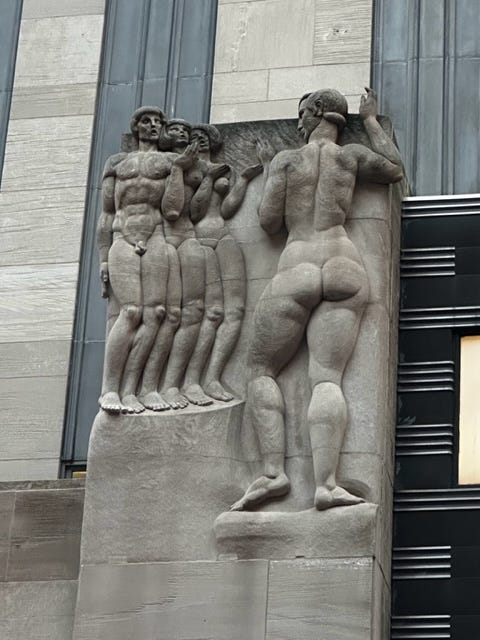Underwhelming Indeed
The NIH is moving far too slowly and in the wrong directions on Long COVID
(If you’re not so into learning about the current state of Long COVID research but are interested in my thoughts and analysis, you may want to skim this first part).
The RECOVER initiative, the U.S. government’s attempt at cracking the code on the mechanisms behind Long COVID and potential treatments, is turning into a massively expensive disappointment to many patients and researchers. The initiative seems to have included patient input into study design for ceremonial purposes only, not meaningfully listening to patient experiences of either the most troubling symptom clusters or the treatments that some of the more advantaged patients (those with financial resources, solid health insurance, and willing medical prescribers) have tried that may hold some promise. At the same time, RECOVER is ignoring both the decades of foundational research into myalgic encephalomyelitis/chronic fatigue syndrome (ME/CFS) and already emergent Long COVID research that could have provided robust springboards into what research should come next.
The healthcare news site Stat published two important articles this week on Long COVID research: an in-depth article this week by Betsy Ladyzhets, titled ‘Underwhelming’: NIH trials fail to test meaningful long Covid treatments — after 2.5 years and $1 billion and Study mapping how SARS-CoV-2 disrupts mitochondria suggests a cause for long Covid by Elizabeth Cooney.
Article one: ‘Underwhelming’
Ladyzhets lays out just what the budget breakdown is on the massive $1.15 billion RECOVER initiative. The lion’s share of the funding - $864 million - has gone toward studies where researchers try to understand Long COVID symptoms and ascertain the underlying mechanisms of the disease. These studies involve large patient cohorts and move painfully slowly, partly due to the administrative work of standing the studies up and partly because studies of this size typically take a long time to yield valid, reliable results.
The other $171.5 million is going toward clinical trials. Ladyzhets points out that many patients are particularly disappointed to see relatively few drugs among the treatments that NIH will test: the antiviral Paxlovid, two common drugs for sleep disorders and two drugs used for autoimmune disorders.
A few prominent names in the fields of Long COVID and ME/CFS research conveyed their thoughts about the RECOVER initiative thus far to Ladyzhets.
David Putrino, head of rehabilitation innovation at Mount Sinai and one of the first to treat and study Long COVID:
the NIH is following an “old rulebook of biological discovery” that may take decades to identify novel treatments.
Todd Davenport, a professor and rehabilitation expert at University of the Pacific who has studied myalgic encephalomyelitis/chronic fatigue syndrome (ME/CFS), a condition that is now a common diagnosis for long Covid patients:
Scientists on the RECOVER team “have parachuted into post-infectious illness and are now trying these things for the first time, to them,” Davenport said. “But it’s clear they haven’t done the reading.”
Davenport and other scientists outside of RECOVER have long lists of drugs that they’d like to test, most of which are not included in the NIH study.
Patients with ME/CFS – especially those who have been suffering for a decade or more – and the researchers who have studied the illness have been looking to the attention received by the COVID-19 pandemic to hopefully, FINALLY get some answers and effective treatment. After all, Long COVID is really just another in a long line of post-viral conditions. Not many people talk about “long flu” or “long H1N1”, yet these illnesses are well-documented and more than likely fall under the umbrella of ME/CFS. By continuing to view any one of these illnesses as standalone, we miss an enormous opportunity to prevent and treat a wide array of related illnesses affecting tens of millions of people worldwide.
Article two: “Disrupts Mitochondria”
There are scientists in the U.S. and around the world who have already done groundbreaking research on some of the underlying mechanisms in Long COVID. Douglas Wallace, the lead researcher on the study that Cooney writes about in Stat, has shown that SARS-COV-2 is surprising in its sophistication at disrupting mitochondrial function in vital organs (you may recall from biology class that mitochondria are the ‘powerhouse’ of the cell, producing energy that powers each cell and collectively, powers the body. It is not a stretch to make the connection between disrupted mitochondria, impaired energy production, and thus profound fatigue).
Wallace’s team was also able to demonstrate on hamsters (☹) that a SARS-COV-2 infection that primarily lives in the lungs can find its way into the cerebellum. No wonder so many of us have ‘brain fog’ – memory loss, cognitive exhaustion, and concentration issues. Like the hamsters, I primarily had shortness of breath with acute COVID; a few months later, an MRI showed a brain lesion that wasn’t there in an MRI I had prior to COVID (thankfully, a follow-up MRI this past June shows the lesion dispersing).
So why didn’t RECOVER ascertain which studies were already underway, or even pore over those that were already complete, and look to these scientists for clues about where to head next?
What about the work of Resia Pretorius and Douglas Kell, who found that 100% of the COVID long haulers they’ve studied have microclots in their blood vessels? What’s the role of these clots in endothelial damage that can lead to organ damage, strokes, or cardiac events down the line?
What about the work of a world-class immunobiologist like Akiko Iwasaki at Yale who is studying not just the pathobiology of Long COVID but of those who develop it soon after being vaccinated? (We in the long haul-o-sphere sometimes refer to these folks as “vax-injured long haulers” – and yes, this is really a thing and there are a larger number of them out there than the government or media lets on.)
Why did no one at the NIH involved in RECOVER do a deeper dive into the work of the Patient-Led Research Collaborative, a group of Long COVID patients who also happen to be researchers? Their paper Long COVID: major findings, mechanisms and recommendations is arguably the best “one-stop shop” review article out there on the subject, covering all of the significant studies to date on Long COVID’s effect on every body system.
Instead, it feels like the areas of study and the scant clinical trials NIH has chosen to include have already gone stale, with little chance of providing any fresh insights.
Where’s the sense of urgency?
This is the burning question on the minds long haulers who are still suffering. Where are the financial resources, beyond the initial appropriation made three years ago now and almost entirely allocated as of June 2023?
Eric Topol, a physician-scientist and author, declared today in his Substack post Long COVID: Mitochondria, the Big Miss, and Hope:
it's well past time—like 3 years overdue—that we go after this with absolute maximum force and priority.
One can’t help comparing Long COVID with the HIV/AIDS crisis. We’re not dying, at least not as quickly as those with HIV/AIDS (there is estimated to have been more than 3500 deaths attributable to Long COVID as of 2022, though this figure is widely viewed as an undercount since it does not include those with a primary cause of death listed that was brought on by Long COVID; it also likely does not factor in the number of suicides due to the extreme upheaval to patients’ lives). Deaths on a grand scale admittedly lend more of a sense of urgency to research. But Long COVID is causing significant immunological and cellular dysfunction and organ system damage that could increase patients’ risks for other serious illnesses and possibly death.
If caring about humanity (23 million and counting at this point in the U.S.) isn’t the driver for our legislators, what about the staggering economic costs? I for one was plucked from the workforce at the height of my earning potential, a painful and difficult adjustment to say the least. David Cutler, an economist at Harvard University, estimated that Long COVID is a $3.7 trillion drain on the U.S. economy, including $997 billion in lost wages, $528 billion in medical costs, and $2.2 trillion in reduced quality of life (a formula based on the number of lost years a long hauler has multiplied by $100k per year).
Recovering without RECOVER
This is all very discouraging. However, to stay optimistic and to contribute my data to the largest study done in the U.S. to date, I tried signing up last fall to be a participant in the RECOVER study at the Mount Sinai Medical Center site in New York City, about an hour south of where I live.
I exchanged a ridiculous number of emails with various study assistants (never the same one twice), finally setting up a time for a phone call to learn more about the study and for them to gauge my interest in enrolling. The site never called me at our agreed upon time. It was then I decided that, with fatigue and post-exertional malaise (PEM) being my main symptoms, I simply could not afford to drag my ass into NYC only to have them tell me “Oops, we didn’t have you down to come in today.”
On top of that, apparently Mount Sinai had not built patient travel reimbursement into their multimillion-dollar grant budget. Seriously??
I spent decades of my non-profit career writing large government grant proposals and I can tell you that including funds for client/patient travel is Grant Writing 101. If you can’t offer participants a stipend, you better at least make sure it doesn’t cost them a dime to participate – especially participants who may be disabled and out of work due to the very reason you’re studying them (!). This misstep also ensured that Mount Sinai was only going to have participants in their study who were from an urban setting (maybe – even the city dwellers should have been provided with Metrocards for the round-trip subway rides to the study site).
Bad form. That was the last straw for me. It’s clear that RECOVER was a mess from the get-go.
Postscript
🔬 Amy the lab specimen - Although I am not participating in the RECOVER study, I have been able to participate in several studies online, where I have filled out questionnaires about my symptoms and the impact they’ve had on my life. I participated in one study remotely through SUNY Stony Brook measuring the effect of a breathing app as well as drinking hydrogen tablets diluted in water. I am also currently enrolled in the Yale LISTEN study, where the aforementioned brilliant immunobiologist Akiko Iwasaki and renowned Yale cardiologist Harlan Krumholz are principal investigators. The Yale study is extraordinarily patient-focused, with regular online meetings to obtain patient input and online conversations and learning sessions for patients.
❤️ For a moving piece on a famous novelist’s experience with Long COVID, check out Long covid has derailed my life. Make no mistake: It could yours, too. A new variant is on the uptick. Don’t be like Robin, people.
🫣 Random pic - Enjoy this pic I took of the side of a building on 50th St. in NYC yesterday involving…it’s hard to say. But might count as a dick pic?
🎶 RIP Sixto Rodriguez - This week we said goodbye to a music legend, the subject of the riveting documentary Searching for Sugarman. I had the great good fortune of seeing this lyrical genius live a few times within the last ten years. He always put on a great show. Here are viddies of one of my faves. Enjoy. Go see the documentary if you haven’t already.
☀️ Thank you for reading. If you enjoyed this post, please consider one of the following.

















Amy, you are so 'right on'! Long COVID is the result of the Sars-CoV2 virus entering cells and locating in the mitochondria where they 1) use mitochondrial energy to replicate 2) produce an inflammatory environment that damages the mitochondria, the ability to make ATP and the ability to self repair by means of mitochondrial biogenesis, 3) weaken and deplete mitochondria thus resulting in reduction of a primary innate immune antiviral function of mitochondria.
As an immunologist who experienced Long COVID, my SubStack is dedicated to laying out the path that I took to return to wellness.
My experience is that LC is treatable with the intention of achieving a cure. A good deal of the information is found in this post: https://longcovidjourney2wellness.substack.com/p/long-covid-choosing-foods-and-nutrients